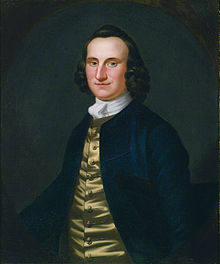Thomas Willing
| Thomas Willing | |
|---|---|

Portrait by John Wollaston
|
|
| President of First National Bank of the United States | |
|
In office 1781–1791 |
|
| Preceded by | Inagural |
| Succeeded by | John Nixon |
| Mayor of Philadelphia | |
|
In office October 4, 1763 – October 2, 1764 |
|
| Preceded by | Henry Harrison |
| Succeeded by | Thomas Lawrence II |
| Personal details | |
| Born |
December 19, 1731 Philadelphia, Pennsylvania |
| Died | January 19, 1821 (aged 89) Philadelphia, Pennsylvania |
| Resting place | Christ Church Burial Ground, Philadelphia |
| Spouse(s) | Anne McCall (m. 1763; her death 1781) |
| Children | 13 |
| Parents |
Charles Willing Anne Shippen |
| Occupation | Merchant, financier |
| Known for | Opposed the Declaration of Independence, president of Bank of North America, then Bank of the United States |
Thomas Willing (December 19, 1731 – January 19, 1821) was an American merchant, a Delegate to the Continental Congress from Pennsylvania and the first president of the First National Bank of the United States.
Thomas Willing was born in Philadelphia, the son of Charles Willing (1710–1754), who twice served as mayor of Philadelphia, and Anne Shippen, granddaughter of Edward Shippen, who was the second mayor of Philadelphia. Thomas completed preparatory studies in Bath, England, then studied law in London at the Inner Temple.
In 1749, after studying abroad in England, he returned to Philadelphia, where he engaged in mercantile pursuits, in partnership with Robert Morris, until 1793.
A member of the common council in 1755, he became an alderman in 1759, associate justice of the city court on October 2, 1759, and then justice of the court of common pleas February 28, 1761. Willing then became Mayor of Philadelphia in 1763. In 1767, the Pennsylvania Assembly, with Governor Thomas Penn's assent, had authorized a Supreme Court justice (always a lawyer) to sit with local justices of the peace (judges of county courts, but laymen) in a system of Nisi Prius courts. Governor Penn appointed two new Supreme Court justices, John Lawrence and Thomas Willing. Willing served until 1767, the last under the colonial government.
A member of the committee of correspondence in 1774 and of the committee of safety in 1775, he served in the colonial house of representatives. As a member of the Continental Congress in 1775 and 1776, he voted against the Declaration of Independence. Later, however, he subscribed £5,000 to supply the revolutionary cause.
...
Wikipedia
